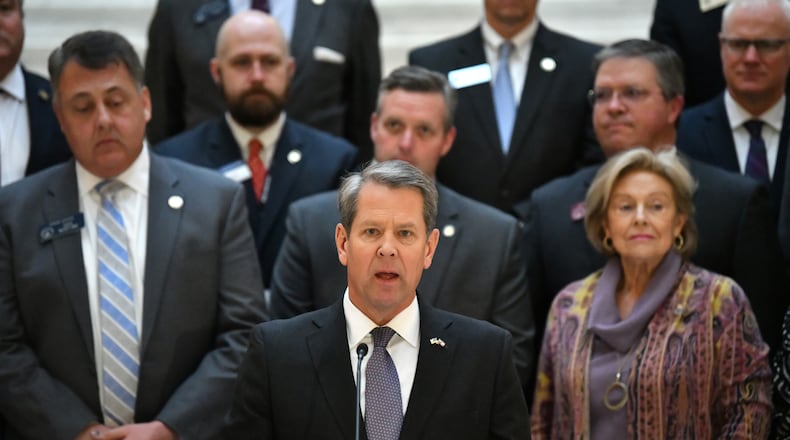Gov. Brian Kemp’s latest financial report reveals his wealth has grown by more than $3 million since he took office in 2019, thanks partly to a string of real estate holdings and business investments that appreciated in value.
The Republican filed paperwork Thursday that showed a net worth of roughly $8.6 million that included more than $4.6 million in various properties and a roughly $420,000 stake in a stone supply firm. In his 2018 disclosure, Kemp reported a worth of $5.2 million.
Kemp’s two top challengers, Republican David Perdue and Democrat Stacey Abrams, both filed their financial disclosures earlier this week.
Abrams’ filing showed she had erased most of her debt and was now worth more than $3 million thanks partly to book deals and speaking gigs. Perdue’s pegged his net worth at roughly $50 million, mostly in real estate holdings and other investments.
Kemp’s financial standing has improved since 2018, when he faced questions about his investment in Hart AgStrong, a struggling seed-crushing business in northeast Georgia that was on the cusp of financial ruin after an ill-fated expansion into Kentucky.
The disclosure showed Kemp earned roughly $730,000 in income from the company between 2019 and 2021, after losing $175,000 from his investment in 2017-2018. Though the report shows an 8% stake in the company with no value, his campaign said he no longer owns a piece of the firm.
Kemp had invested $750,000 in the company more than a decade ago and guaranteed $10 million in loans to Hart AgStrong — about twice the net worth he reported in his 2018 state disclosure.
The investment had dogged Kemp throughout his campaign for office. Rick Phillips, a well-connected financier, claimed in a 2017 lawsuit that Kemp failed to repay the loan he negotiated and guaranteed for Hart AgStrong.
Kemp settled the lawsuit days before he was sworn into office in 2019, and the company was sold to Perdue AgriBusiness months later. The Maryland-based firm is not linked to David Perdue, a former U.S. senator challenging Kemp.
Phillips’ lawsuit, and another filed by other investors that was settled for roughly $200,000, factored prominently in Kemp’s campaign for governor. Both Abrams and then-Lt. Gov. Casey Cagle, a Republican, invoked the court battle to raise concerns about Kemp’s financial viability and his business background.
The new plant was pitched to local farmers in Kentucky as a lucrative way to diversify their crops using a portion of their land to grow plants not usually cultivated in the steamier Southern climate.
But it struggled with technical problems and flawed financial decisions that roiled the small Kentucky town where it’s located. One local businessman told The Atlanta Journal-Constitution that people “feel betrayed” by its owners. At one point, the company tallied more than $2 million in missed payments to area farmers.
As the election approached, Kemp said he knew little about Hart AgStrong’s inner workings. In a court deposition, Kemp used variations of “I don’t know,” “I don’t remember” or “I don’t recall” at least 91 times when asked about the company’s finances and operations.
Kemp distanced himself from the company as its financial problems mounted. He resigned from its board in August 2017 and his stake in the company steadily shrank before it was sold.
In his latest financial disclosure, Kemp reported nearly $8.8 million in assets that included a $675,000 house in Athens and $270,000 in cash.
About the Author
The Latest
Featured





